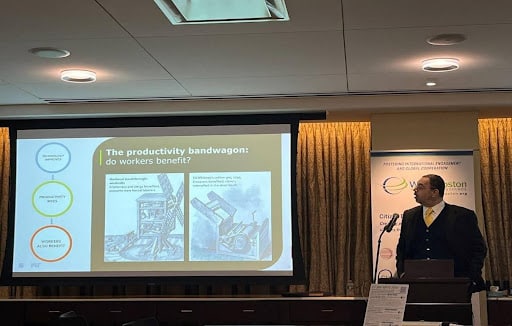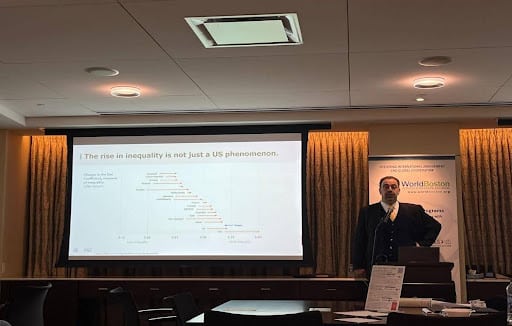
WorldBoston’s February Chat & Chowder event featured a thought-provoking discussion led by Professor Daron Acemoglu, drawing insights from his book Power and Progress. Professor Acemoglu is currently the Elizabeth and James Killian Professor of Economics at MIT and was welcomed to the event by WorldBoston’s President Mary Yntema. The speaking program was bookended by lively networking, including conversation with other attendees and the speaker, refreshments, and book purchases.
The event explored the multifaceted nature of disruptive technologies shaping our world, revealing a complex landscape brimming with both opportunities and challenges. As we stand on the precipice of a potential technological revolution, concerns about the impact on society and the workforce are amplified. This recap delves into the key takeaways from Dr. Acemoglu's presentation and explores their implications for our collective future.
Beyond the "Productivity Bandwagon"
American optimism often paints technological progress as a linear path towards shared prosperity. This sentiment hinges on the notion of a "productivity bandwagon," where advancements lead to increased output, ultimately benefiting workers through higher wages and improved working conditions. However, Professor Acemoglu challenged this narrative by presenting historical examples that illustrate its limitations.

Throughout his talk and in Power and Progress, Professor Acemoglu highlighted how historical breakthroughs haven't always translated into widespread prosperity. Medieval windmills, despite revolutionizing energy use, failed to benefit the masses due to a feudalistic society where labor lacked power. Similarly, the cotton gin, a pivotal 18th-century invention, contributed to elite wealth while maintaining oppressive conditions for enslaved workers. These historical patterns underscore the critical role of institutions and power dynamics in shaping the outcomes of technological change, since “all of this is embedded in broader social relations”, says Dr. Acemoglu.
The Critical Leap in the Age of AI
Professor Acemoglu emphasized the need for specific conditions to ensure the "productivity bandwagon" functions effectively. Two key factors emerge: the willingness of firms to employ more workers as productivity increases and their commitment to higher wages. However, in the age of AI, this leap becomes even more consequential, with challenges ensuring new technologies genuinely benefit workers. “Information was central in the Industrial Revolution, but today it is about who controls that information,” observes Dr. Acemoglu.
Power Dynamics at Play
Echoing his book's emphasis on inclusive institutions, Professor Acemoglu highlighted the crucial role of power distribution in shaping the impact of technology. Historical examples demonstrated that without adequate worker voice and power, technological advancements may lead to labor exploitation rather than shared prosperity. This underscores the critical need for inclusive institutions and a balance of power to ensure technology serves society as a whole.

Professor Acemoglu challenged the popular notion that the industrial revolution ushered in widespread prosperity, aligning with his nuanced historical analysis in Power and Progress. He highlighted the hardships faced by workers during the first century of this era, when automation often led to job displacement, declining real wages and loss of worker voices in the face of “new establishing corporate visions.”
The Automation Imperative and Shaping the Future of Work
The discussion then shifted to contemporary challenges, focusing on the post-1980 digital age, as analyzed in Power and Progress. Professor Acemoglu pointed to declining real wages for certain groups, particularly those with lower education levels, contributing to increased inequality. Globalization, changes in union power, and societal shifts were identified as key factors contributing to this economic shift, echoing his broader arguments in the book about the distribution of gains from technological progress.
A significant portion of the discussion delved into the economic incentives for automation and the evolving ideology within the tech industry. Professor Acemoglu expressed concerns about the shift towards autonomous machines, raising concerns about potential negative impacts on workers, mirroring his analysis in Power and Progress. He emphasized the crucial role of profit incentives, labor power, and the ideology surrounding technology choices in shaping the direction of technological transitions. “The problem isn’t just economic. With AI and data, power relations are very lopsided today,” he observes.
As the world stands on the cusp of transformative AI technologies, Professor Acemoglu expressed concerns about the potential exacerbation of inequalities, aligning with his warnings in Power and Progress. He advocates for better quality data for AI and Language Models to grow from, since “data is not priced.” However, he concluded with a glimmer of hope, pointing to proof of concept studies showcasing the potential for AI to be used in a more worker-friendly manner, echoing his call for inclusive technological advancements. He also called for a change in tech narratives where there is more democratic control and a power redirection.

